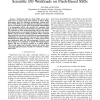Free Online Productivity Tools
i2Speak
i2Symbol
i2OCR
iTex2Img
iWeb2Print
iWeb2Shot
i2Type
iPdf2Split
iPdf2Merge
i2Bopomofo
i2Arabic
i2Style
i2Image
i2PDF
iLatex2Rtf
Sci2ools
116
click to vote
CLUSTER
2009
IEEE
2009
IEEE
A performance evaluation of scientific I/O workloads on Flash-based SSDs
Abstract-- Flash-based solid state disks (SSDs) are an alternative form of storage device that promises to deliver higher performance than the traditional mechanically rotating hard drives. While SSDs have seen utilization in embedded, consumer, and server computer systems, there has been little understanding of its performance effects with scientific I/O workloads. This paper provides a trace driven performance evaluation of scientific I/O workloads on SSDs. We find that SSDs only provide modest performance gains over mechanical hard drives due to the writeintensive nature of many scientific workloads. Other workloads (like read-mostly web servers) would likely see much larger gains. Additionally, we observe that the concurrent I/O (when multiple parallel processes simultaneously access a single storage device) may significantly affect the SSD performance. However, such effects appear to be dependent on specific SSD implementation features and they are hard to predict in a general fas...
| Added | 14 Aug 2010 |
| Updated | 14 Aug 2010 |
| Type | Conference |
| Year | 2009 |
| Where | CLUSTER |
| Authors | Stan Park, Kai Shen |
Comments (0)

